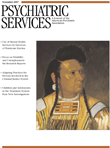Psychiatrists and Religious Belief
To the Editor: The article in the September issue by Curlin and colleagues (
1 ) presents interesting data on the religious beliefs (or lack thereof) of U.S. psychiatrists. The authors appropriately note the historical antipathy to conventional religion expressed in some of Freud's writing.
I believe that part of psychiatry's difficulty in dealing with religious beliefs stems from a failure to distinguish pathological religiosity from what I would call the religious impulse. Consider, on the one hand, Mr. A, who is convinced not only that his religion is valid but that it is the only "true faith" and that everybody else is a "heretic." Mr. A is completely impervious to any attempts to challenge his beliefs, rituals, or religious practices. Any attempt to do so sends him into fits of rage and evokes fantasies of "avenging the slur against the One True Faith."
Now consider Ms. B. She describes herself as "not a religiously observant" person but one who does attend religious services "when I'm feeling a little lost or alone." Ms. B is not sure she believes in an "all-knowing, all-powerful God"; however, she says, "I feel like there is something out there greater than us—some kind of order or intelligence in the universe that I feel drawn to really strongly." Ms. B has undertaken psychotherapy to "help figure out who I am and where I'm headed—is there a purpose to life beyond just working and getting by?"
Ms. B's relationship to faith is clearly very different in tone and content from that of Mr. A. I believe Freud would have been quite wrong in regarding Ms. B's religious impulse as "neurotic" in any way. Not only should psychotherapy be tolerant of what in my view is a mature kind of religious impulse; psychotherapy's goals should be quite compatible with those of a "seeker" such as Ms. B. Of course, we must also be respectful of patients who espouse more conventional or "orthodox" religious beliefs and not reflexively see these as impediments to therapeutic progress.
Finally, with respect to the findings of Curlin and colleagues, there is much room for clarification of what the term "religious" means, both to patients and to psychiatrists. In 1929 during a dinner party in Berlin, someone asked Einstein whether he was religious, and his response has been widely repeated: "Try and penetrate with our limited means the secrets of nature, and you will find that, behind all the discernible concatenations, there remains something subtle, intangible and inexplicable. Veneration for this force beyond anything that we can comprehend is my religion. To that extent I am, in point of fact, religious."

